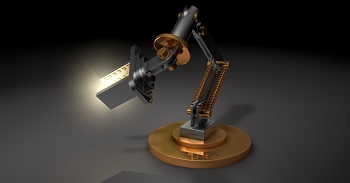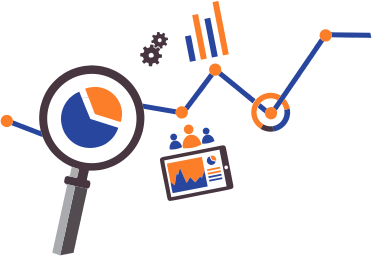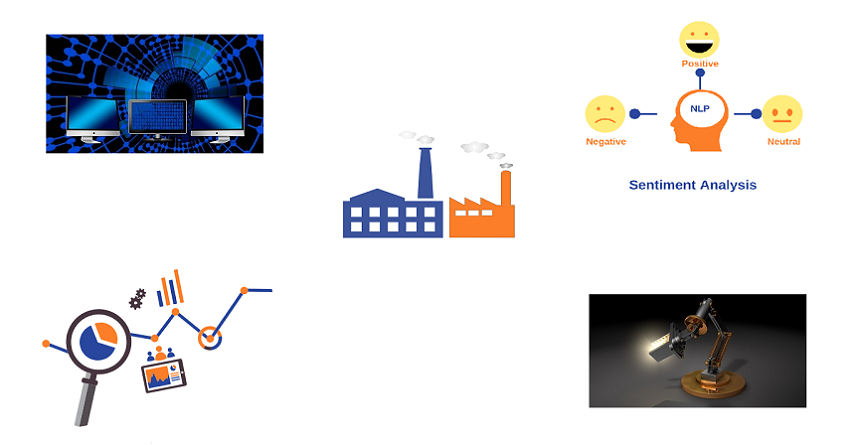Artificial Intelligence (AI) has changed the way businesses are performing today. According to a recent study AI manufacturing market is expected to grow around USD 17.2 billion by 2025, at a CAGR of 49.5% with great support from industrial IoT and automation sectors. 
AI has automated the routine tasks and made processes faster and easier. Using AI, companies are able to make advances in the areas of sentiment analysis, image and voice recognition, language understanding, and predictive analysis of consumer behavior.
AI has offered great potential and room for the optimization of electrical and electronics industry, and it focuses on bringing about significant changes not only in the economic aspect, but also in safety and actual operation control.
The fundamental challenges that electronics manufacturing companies face are – forecasting, supply chain issues, and material distribution worries.
Further, AI can vividly increase the overall productivity, which is the ultimate aim of any manufacturing industry, including original design manufacturers (ODMs) and original equipment manufacturers (OEMs). AI combined with industrial automation has advanced considerably in the past few years.
 Rapid advances being made in developing machine learning (ML) models and advancements in sensors has made a significant growth in gathering volumes of data, apart from the computing power that helps in building advanced state-of-the-art software applications. These apps can analyze large sets of data, identify different patterns, detect anomalies and ensure accurate predictions, and ultimately make defined decisions automatically based on continuous learning.
Rapid advances being made in developing machine learning (ML) models and advancements in sensors has made a significant growth in gathering volumes of data, apart from the computing power that helps in building advanced state-of-the-art software applications. These apps can analyze large sets of data, identify different patterns, detect anomalies and ensure accurate predictions, and ultimately make defined decisions automatically based on continuous learning.
AI allows customers to also have a say in the designing of the products. For e.g., by making use of complex algorithms and leveraging the benefits of blockchain to secure data, AI offers customer-centric solutions that involve customers’ opinions and responses about the product.
AI with deep learning has the ability to learn on its own. Thus, it allows machines to easily adapt to new environments and algorithms through machine intelligence, language detection, and sentiment analysis and image & speech recognition.
With the help of predictive analytics, AI allows scheduling the equipment operation and maintenance that will timely aid in extending the lifetime of the equipment.
Futher, it can help manufacturers in:
- Robust decision-making
- Better production outcomes
- Enhanced process effectiveness
- Reduce operational costs
- Superior scalability
- Improved product development
- Translates natural language making communication easier
AI creates an impact on electronics manufacturing companies in two areas – product design and operations. Software-defined products have been in the market for several years, and they enable rapid service development and deployment. AI helps in differentiating various products, makes them smarter, and companies can escape commoditization of hardware.
AI enhances the functional scope of the products by hiding its complexity – thereby helping humans to focus more on how the device can be used according to their needs. For e.g., Automated cooking devices that come with voice instructions, the new generation of smart phones with excellent cameras that click automated pictures. Alexa and Siri are another great examples where users interact with electronic devices through voice without any physical action.
Therefore, AI will help in simplifying the manufacturing processes through intelligent software that knows what the user wants and how it wants. This will allow companies to save loads of manufacturing time and reduce overall costs.
 The emerging electronics companies leverage AI apps in a way that allows them to bring in innovative, user-friendly and high-end technology products in the evolving market place. While doing so companies should also focus on the quality of the product without compromising it in any way. To achieve this, AI-powered systems provide speed and efficiency that will help companies to manage projects efficiently.
The emerging electronics companies leverage AI apps in a way that allows them to bring in innovative, user-friendly and high-end technology products in the evolving market place. While doing so companies should also focus on the quality of the product without compromising it in any way. To achieve this, AI-powered systems provide speed and efficiency that will help companies to manage projects efficiently.
AI systems give companies incomparable ability to monitor massive chunks of data from different sources, thus, helping them to keep a check on the product’s progression in real-time. Now companies need not rely on humans for inspection and quality control, as several companies are using AI-powered smart cameras having complex algorithms that help in spotting defects quickly and identify root causes for the failure.
The human eye can miss small defects and let them pass by but, AI solutions won’t let this happen as they can catch the smallest of the inefficiencies easily. AI systems can anticipate failures that can likely happen by collecting the necessary data offering insights into future performance.
Electronic manufacturers make use of a process called generative design that is a software program where design engineers need to feed the system with factors like input design goals, materials, manufacturing methods, and costs involved. When all the details are fed into the system, the machine with the help of Machine Learning (ML) and AI techniques generates several iterations for the inputs given. Autodesk is a great example that uses AI technology to produce generative designs for electrical products.
We need not be surprised that today several companies make use of robotics to perform various manufacturing jobs. AI-powered robots now can perform automated tasks without being programmed. Siemens introduced a two-armed Robot in the year 2017 that could perform manufacturing jobs without any specific program required.
While AI is still in its developmental stage, nevertheless it will soon change the manufacturing sector. AI has already transformed several industries that have welcomed it with both hands. As technology is rapidly evolving in the electronics manufacturing sector companies can now make better data-driven decisions, optimize the regular processes, reduce operational costs, and provide better customer services. AI will change the way electronic industry will make use of the technology to design products and perform manufacturing tasks.

